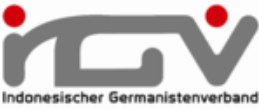ANALYSIS OF SPRECHEN A1 EXERCISES ON THE WEBSITE WWW.LEARNGERMAN.DW.COM
Abstract
In learning German there are four skills that must be mastered, Listening (Hören), Reading (Lesen), Speaking (Sprechen) and Writing (Schreiben). Each skill has a different difficulty. Speaking (Sprechen) is a skill that is quite difficult to master. Therefore, alternative learning resources are needed that can be used freely and can facilitate the learning process. Www.learngerman.dw.com is one site that can be used as an alternative learning resource. This site provides speaking exercises, the unique thing in this site is that speaking exercises are provided continuously with other skill exercises. The purpose of this study is to describe꞉ 1) The types of Speaking (Sprechen) exercises found on the website www.learngerman.dw.com, 2) The steps for doing the Speaking (Sprechen) exercises which are found on the site www.learngerman.dw.com, 3) Speaking (Sprechen) exercises available on the site www.learngerman.dw.com with the Kriterienkatalog fur Internet-Lernmaterial Deutsch als Fremdsprache. The method used in this research is descriptive analysis. The types of Sprechen exercises found on the website are analyzed based on Schatz theory. The results showed that 1) There were 411 vorbereitende Übungen and 97 aufbauend und strukturierend exercises, while simulierend exercises were not available; 2) The steps for doing the A1 Speaking (Sprechen) exercise on this website have different steps, but each theme has the same starting steps which is watching a video; 3) The Speaking (Sprechen) exercise on the website www.learngerman.dw.com has met 13 of the 18 criteria based on the Kriterienkatalog fur Internet-Lernmaterial Deutsch als Fremdsprache. Thus, this website can be used as an alternative learning resource to improve speaking skills.
Full Text:
PDFReferences
Abdullah, R (2012). Learning based on the utilization of learning resources. Scientific Journal of Didaktika, 12(2), 216-231.
Chaudhuri, T., Gofman, N., Hain, D., Kamarouskaya, V., Krebs, N., Puskás, C., Reichel-Wald, K., Rösler, D., Savitskaia, N., Siri, F., Ufer, J., Vasilyeva, V., and Vilde, Z. (2002).Kriterienkatalog für Internet-Lernmaterial Deutsch als Fremdsprache.
Dessy, W. A. (2012). Education research: An approach using SPSS. Ponorogo: STAIN Ponorogo Press.
Dorner, E. (2022). Online-Nachhilfe vs. Offline-Nachhilfe: Vorteile & Nachteile. Digitales Lernen.
Muhtadi, A. (2006). Learning resources management module. UNY.
Nonnenmacher, A. (2019). Sprechen [Online].
Rusman. (2009). Information and communication technology in learning. Bandung꞉ Department of Curriculum and Educational Technology. Faculty of Education. University of Education Indonesia.
Syukur, F., & Ichwan, M. N. (2008). Educational technology. Semarang, Indonesia: Rasail.
Bytwerk, R. L. (1985). Impromptu speaking exercises. Communication Education, 34(2), 148–149.
Sunte, J. (2023). The languages speaking as good exercise in practical human life (Vol. 5).
Dwyer, J., & Faber-Langendoen, K. (2018). Speaking up: An ethical action exercise. Academic Medicine, 93(4), 602–605.
Khodjieva Ranokhon Akmalovna (2020). Peculiarities of exercises oriented to teaching speaking. Вестник науки и образования, (6-1 (84)), 70-72.
Aswad, M. (2017). Is It Truly Improvisational Exercise Push Students’ Speaking Ability. Eduvelop: Journal of English Education and Development , 1(1), 9-17. Pereira, J. A., Sanz-Santamaría, S., Perurena, I., & Gutiérrez, J. (2012, September 14–15).
Interactive speaking practice, assessment and exercise sharing with Babelium plug-in. In Proceedings of the 1st Moodle Research Conference (pp. 107–114). Heraklion, Crete, Greece.
Anderson, J., Lapinski, M. K., Turner, M. M., Peng, T. Q., & Schmälzle, R. (2021). Speaking of Values: Value-Expressive Communication and Exercise Intentions. Health Communication, 37(10), 1285–1294.
DOI: https://doi.org/10.17509/alm.v13i1.71839
Refbacks
- There are currently no refbacks.
Copyright (c) 2024 Melky Ayu Wijayanti, Ahmad Hanif, Ending Khoerudin

This work is licensed under a Creative Commons Attribution-ShareAlike 4.0 International License.
This journal provides immediate open access to its content on the principle that makes research freely available to the public and supports a greater global exchange of knowledge.
This work is licensed under a Creative Commons Attribution-ShareAlike 4.0 Internasional (CC BY-SA 4.0).

_(1)_(1)_(3)_.png)

